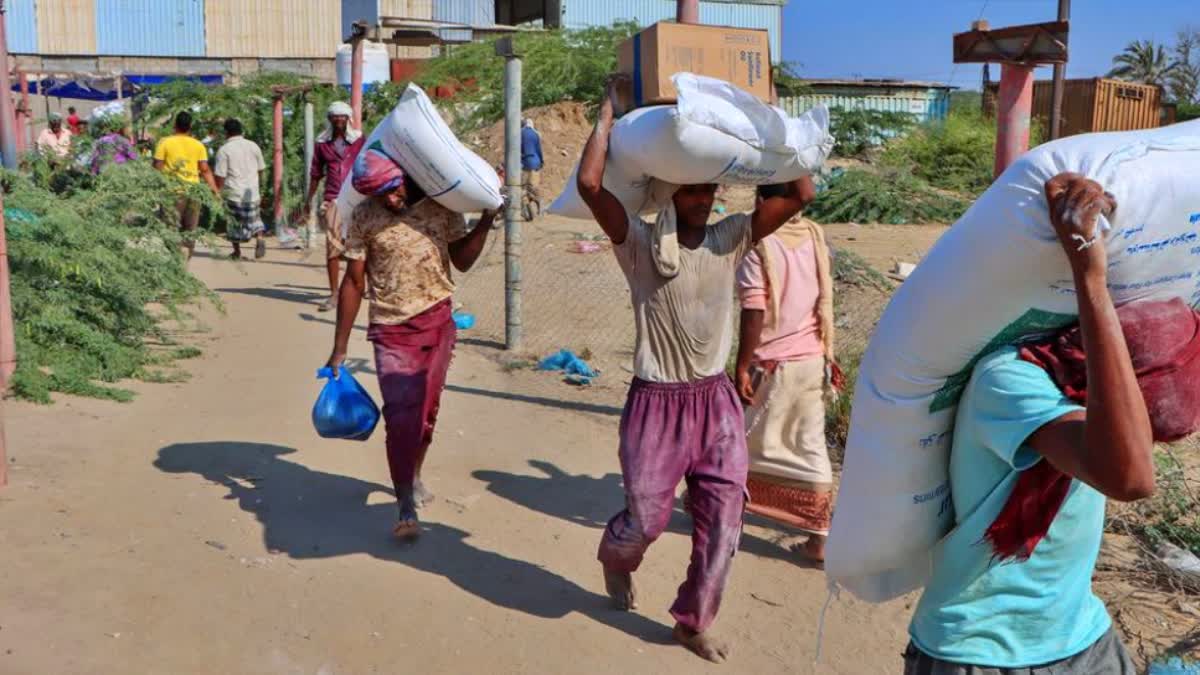UNITED NATIONS: Five United Nations staff members who were kidnapped in Yemen 18 months ago by an al-Qaida affiliate have walked free, U.N. officials said Friday.
David Gressly, the U.N. humanitarian coordinator in Yemen, said the five men -- four Yemenis and one from Bangladesh — were "in good health, good spirits ... but they went through a very difficult period of isolation."
The five were freed after lengthy negotiations that included officials from Oman, U.N. deputy spokesman Farhan Haq said.
Gressly, who spoke to U.N. reporters after flying with the four Yemenis to the country's southern port city of Aden, said: "I can confirm that the hostage-takers were al-Qaida in the Arabian Peninsula."
Also known as AQAP, the group has been active in southern Yemen for years and is considered one of the global al-Qaida network's most dangerous branches. It has attempted to carry out attacks on the U.S. mainland.
-
Good news: Five UN staff members kidnapped in Yemen in February 2022 have been released in apparent good health.@antonioguterres calls for the perpetrators to be held accountable, and reiterates that kidnapping is an inhumane & unjustifiable crime.https://t.co/3rjAuLfqWe
— United Nations (@UN) August 11, 2023 " class="align-text-top noRightClick twitterSection" data="
">Good news: Five UN staff members kidnapped in Yemen in February 2022 have been released in apparent good health.@antonioguterres calls for the perpetrators to be held accountable, and reiterates that kidnapping is an inhumane & unjustifiable crime.https://t.co/3rjAuLfqWe
— United Nations (@UN) August 11, 2023Good news: Five UN staff members kidnapped in Yemen in February 2022 have been released in apparent good health.@antonioguterres calls for the perpetrators to be held accountable, and reiterates that kidnapping is an inhumane & unjustifiable crime.https://t.co/3rjAuLfqWe
— United Nations (@UN) August 11, 2023
"This is a threat that remains here in in Yemen — and remains actually an increasing threat," Gressly said of al-Qaida.
In February 2022, suspected al-Qaida militants abducted five U.N. staff members in southern Yemen's Abyan province, Yemeni officials told The Associated Press at the time.
In a statement earlier Friday, the U.N.'s Haq named the freed men as Akm Sufiul Anam; Mazen Bawazir; Bakeel al-Mahdi; Mohammed al-Mulaiki; and Khaled Mokhtar Sheikh. All worked for the U.N. Department of Security and Safety, he said.
Sufiul Anam, a retired Bangladeshi lieutenant colonel who was the department's field coordinator, told a news conference after arriving at Dhaka airport Wednesday that he never thought he'd return home after a "horrifying" experience in Yemen's hills and desert at the hands of "terrorists."
Also read-UN worried over clashes in Lebanon that affected education of 6,000 Palestinian refugee kids
"There was a fear of death every day; it cannot be expressed in words; it is seen in films only," Sufiul Anam said, according to Bangladeshi newspaper Prothom-alo. "I was blindfolded all the time. The terrorists changed my location 18 times and kept me at 10 places. Fortunately, they did not torture me."
Bangladesh's National Security Intelligence Director Imrul Mahmud was quoted by the newspaper as saying it was a long process to free him: "The kidnappers had demanded $3 million in ransom, but we did not need to pay any money."
Gressly said the United Nations never pays ransom, which is one reason the U.N. staffers may have been held for so long.
Three Yemeni security officials and a tribal leader also said that al-Qaida in the Arabian Peninsula was behind the kidnapping in Abyan province. Sufiul Anam said they were kidnapped as they were returning to Aden from the village of Mudiyah after a field mission.
Also read-Yemen: At least 85 killed, hundreds injured in stampede
The Yemeni security officials and tribal leader said that after a series of fraught negotiations mediated by tribal leaders, a ransom was paid to the al-Qaida militant group and the U.N. employees were subsequently released. The three security officials spoke on condition of anonymity, as they were not briefed to speak with journalists. The tribal leader requested anonymity out of fear of reprisals.
U.N. deputy spokesman Haq responded to their statements that a ransom was paid reiterating: ""The U.N. does not pay ransoms and we do not encourage other parties to pay ransom."
No further details about the alleged payment were provided, and the security sources did not specify which body or individual presented the random funds.
A spokesman for the Saudi-led coalition, which backs Yemen's internationally recognized government in its war against Iran-backed Houthi rebels, did not immediately respond to a request for comment on the issue of the ransom.
The AP was unable to reconcile the account of the Yemenis with Gressly's and Haq's statements on the U.N.'s no-ransom position.
Also read-422 Indians visited Yemen defying travel ban; their passports seized: Jaishankar tells Rajya Sabha
Gressly told reporters he did not want to give details about the staff members' captivity.
"They're extremely pleased to be back here in Aden," he said. "I think now's the time for us, simply to celebrate their return, to give them time to get back with their families."
"There's a lot that will have to be processed in the days and weeks to come for them," he said. ""This is a very difficult situation to for anybody to live through, but they seem to have come through in remarkable condition."
Kidnappings are frequent in Yemen, an impoverished nation where armed tribesmen and militants take hostages to swap for prisoners or cash.
War has ravaged the country since 2014, when Houthi rebels seized the country's capital, Sanaa, and much of the north, and forced the government into exile.
A Saudi-led coalition that included the United Arab Emirates intervened the following year to try to restore Yemen's internationally recognized government to power.
Al-Qaida has since exploited the conflict to cement its presence in the country. (AP)



